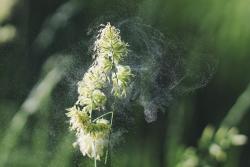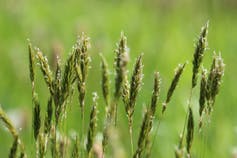We're working on a more accurate pollen forecasting system using plant DNA
![]() This article by Simon Creer, Professor in Molecular Ecology, School of Biological Sciences and Georgina Brennan, Postdoctoral Research Officer, Bangor University was originally published on The Conversation. Read the original article.
This article by Simon Creer, Professor in Molecular Ecology, School of Biological Sciences and Georgina Brennan, Postdoctoral Research Officer, Bangor University was originally published on The Conversation. Read the original article.
Most people enjoy the warmer, longer days that summer months bring – but plant allergy sufferers will have mixed emotions. Roughly one in five Europeans suffers from allergic reactions to tree, grass and weed pollen causing pollinosis, hay fever and allergic asthma.
 Grass flower shedding pollenAllergies to substances such as pollen are driven by errors in the body’s immune system, which means it mounts a response to otherwise benign substances from plants. On first exposure to pollen, the body decides if some of the otherwise harmless proteins in the pollen are dangerous. If it decides they are, the immune system produces immunoglobin E (IgE) antibodies in a process called sensitisation.
Grass flower shedding pollenAllergies to substances such as pollen are driven by errors in the body’s immune system, which means it mounts a response to otherwise benign substances from plants. On first exposure to pollen, the body decides if some of the otherwise harmless proteins in the pollen are dangerous. If it decides they are, the immune system produces immunoglobin E (IgE) antibodies in a process called sensitisation.
The next time the body is exposed to pollen, it remembers the proteins and mounts another response. The IgE antibodies detect the pollen in, or on, the body, and cause cells to release histamine and a variety of other chemicals. This results in symptoms ranging from itchy eyes and nose, to production of mucous, inflammation and sneezing fits.
But while we know that “pollen” causes this response, at present we still don’t know all the types of pollen that cause the body to react.
Forecasting hay fever
In the UK, a daily pollen forecast is generated by the UK Met Office in collaboration with the National Pollen and Aerobiology Unit (NPARU), to help allergy sufferers. This forecast is created using data from a network of pollen traps which operate throughout the main pollen season (March to September) and measure how many pollen grains are present on a daily basis.
Pollen from different types of tree can be identified using microscopes, but grass pollen grains all look the same. As a result the pollen forecast for grasses (of which there are 150 types in the UK alone) is based on the broad, undifferentiated category of “grass”. That is despite grass pollen being the single most important outdoor aeroallergen.
 Sweet vernal, an early flowering grass: Image: Simon CreerWe already know that different species of grass pollinate at different times in the year, and allergic reactions can occur at different times throughout the allergy season. What we need to figure out is whether allergies are caused by all species, specific species, or a combination of species of grasses. We also need to learn how pollen grains change in composition in time and space. While pollen is known for being very tough and is often well preserved in sediments, it can be very fragile in certain circumstances, such as bursting when in contact with rain drops.
Sweet vernal, an early flowering grass: Image: Simon CreerWe already know that different species of grass pollinate at different times in the year, and allergic reactions can occur at different times throughout the allergy season. What we need to figure out is whether allergies are caused by all species, specific species, or a combination of species of grasses. We also need to learn how pollen grains change in composition in time and space. While pollen is known for being very tough and is often well preserved in sediments, it can be very fragile in certain circumstances, such as bursting when in contact with rain drops.
To find out which grasses are linked to the allergic response, we need to know many things, such as where and when species of grass are releasing pollen. We also need to uncover how the pollen moves through the atmosphere, quantify the exposure of grass pollen species in time and space, and work out how allergies develop across broad geographical and temporal scales.
The #PollerGEN project
Our Natural Environment Research Council (NERC) PollerGEN project team is now working on a way to detect airborne pollen from different species of allergenic grass. We’re also developing new pollen source maps, and modelling how pollen grains likely move across landscapes, as well as identifying which species are linked with the exacerbation of asthma and hay fever.
We’re going to be using a new UK plant DNA barcode library, as well as environmental genomic technologies to identify complex mixtures of tree and grass pollens from a molecular genetic perspective. By combining this information with detailed source maps and aerobiological modelling, we hope to redefine how pollen forecasts are measured and reported in the future.
We have just started the third year of pollen collection and hope to road test the combined forecasting methods over the next year. In the long run, our vision is to be able to provide specific pollen forecasts for grass, and unravel which species of grass pollen are most likely causing allergic responses. More broadly, we also want to provide information to healthcare professionals and charities, who can translate this information to help pollen allergy sufferers live healthier and more productive lives.
In the meantime, if you suffer from pollen allergies, sneeze or wheeze during spring, speak to a doctor or pharmacist to prepare an action plan. You can also get support from Allergy UK, and information about the pollen forecast from the UK Met Office.
(Video from 6abc Action News YouTube Channel Published by them on May 8, 2018)
Publication date: 21 June 2018
